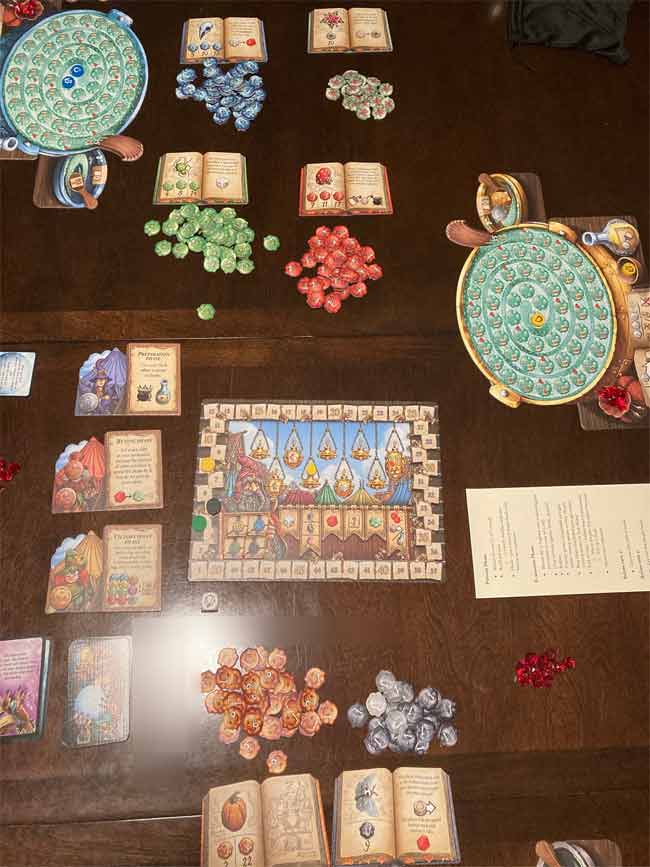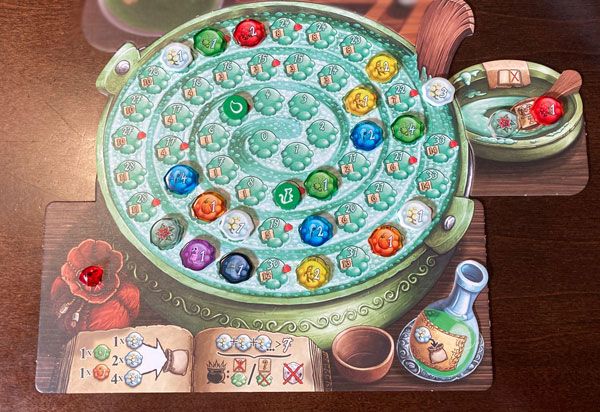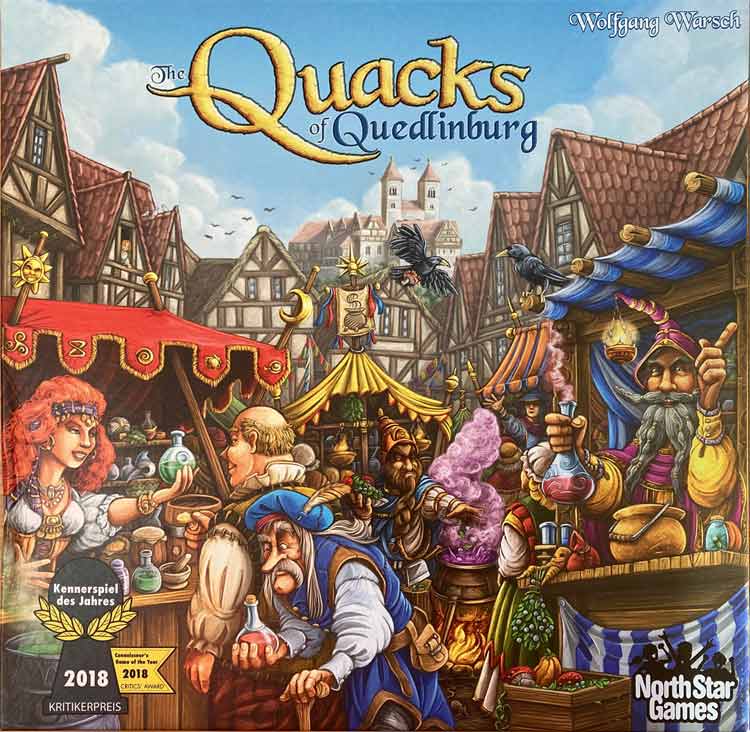The Quacks of Quedlinburg is a game originally published by North Star Games and now published by CMYK Games. The premise of the game is for players to take on the role of quack doctors brewing up concoctions one ingredient at a time. Add too many ingredients and you'll spoil the pot, but play it too safe and you may fall behind. At the end of nine rounds the player with the most victory points is declared the winner.
This post is broken into the following 3 sections, feel free to jump directly to one:
- General summary - consisting of information about overall enjoyment, theme, replayability, and upgrades
- Complexity - consisting of information about the rulebook, setup, player turns, and overall learning curve
- Player turns - consisting of game type, game flow, rule you are likely to miss, and favorite aspect
General Summary
Number of players we had: 4
Our play time (not including setup): 55 minutes
Overall enjoyment

Overall our group always enjoys playing this game and there are several things we like about it. It might surprise you to know that while I had seen this game at our favorite local game store, I passed on it several times before buying. I'm happy I changed my mind since we have spent hours of fun playing The Quacks of Quedlinburg.
One thing we like is that some strategy and planning is needed because the ingredient chips you purchase at the end of each round shapes the benefits you can receive later. If you don't pay enough attention to the ingredient benefits, you may miss out on opportunities that will advance your game more quickly. As an example, if you pass on a chip that allows players to move the next ingredient chip twice as far as its normal value and other players are using it, their pots are likely to be bigger which has several benefits.
In addition to planning and strategy, this game involves a decent amount of luck. This game has ups and downs each round because it has a strong press-your-luck element. Ingredient chips are blindly pulled out of a bag, so planning and strategy only takes you so far. Sometimes you will have a great run and pull hardly any cherry bombs - which will eventually explode your pot if you have too many. Other rounds you will have horrible luck and your pot will have very few ingredients other than cherry bombs. Each round you must decide how far to push your luck because if your pot explodes, you will lose one of two end-of-round benefits: victory points or the ability to purchase additional ingredient chips.
Another thing we like is that when one player gets way ahead of others in victory points, the other players add ingredients further into their pot based on how far they are behind. This allows them a chance to catch up, but is temporary as the starting point for each player is re-analyzed before the start of each new round. In this way, it is much harder for one player to run off with the game.
Lastly, when players are purchasing new chips at the end of each round, they can only purchase two and they must be different chips. This is another way the game mechanics help prevent a single player from dominating the game.
All in all, this game has the perfect mix of luck, strategy, and risk-taking to make it fun and enjoyable each time you play it. This is even more true when you add one or both expansions!
Theme

The theme is cute and the ingredient chips and cards are well thought out. The main game board is very compact, yet it tracks player victory points, the round number, when to add additional ingredients, and all actions taken each round after player pots are built. Together the main board, player boards, ingredient cards and chips all tie the theme together perfectly.
Replayability

The base game comes with several different ingredient chips, most of which have four possible benefits, 1-4. The same set of benefits for each ingredient will always be played together. This means if players choose version two, the second benefit for each ingredient will be used throughout that game.
Another thing that increases the replayability is the unpredictability of the game play. Some rounds you will pull almost nothing but cherry bombs and your pot will easily explode. Other rounds you will pull stronger ingredients and create powerful combinations that greatly advance your game. There is just no way to know what will happen next.
Lastly, your pot is compared to all other players' pots and getting further than everyone else gains you certain benefits. This means each game is different based on who else you are playing with, and how their luck holds up against yours each round.
Upgrades

Currently, there are two expansions to The Quacks of Quedlinburg - The Herb Witches and The Alchemists. If you are interested in learning more about either expansion, this is a link to a previous game blog review discussing both expansions. Also, if you are interested in what is inside The Alchemists expansion, check out the unboxing video below. We enjoy what both expansions bring to the base game, especially how well they integrate with the original game.
Also, here is a look at some upgraded tokens that can be purchased for the base and first expansion game, The Herb Witches. These tokens are great if you are looking to upgrade your game, or for players with dexterity issues.
Complexity
Rule book
The rule book is short, well-organized and easy to follow. There are images to explain the setup and what different symbols mean and the different parts to each round. Additionally, there are longer explanations of how each version of the ingredients works for the game version you are playing, from 1-4.
Setup
The Quacks of Quedlinburg takes 5-10 minutes to set up. Choose which version from 1-4 of the game you are going to play, set out the ingredient chips and their cards with the correct version. Players will need to pick a colored pot with corresponding droplet, flask, rat stone and bag. Add player tracking tokens to the main game board and fill each player bag with the starting ingredients and you are ready to play.
We typically read each of the benefits of those ingredient that the game starts with and then read the additional ingredients as they become available during later rounds, such as the Mandrake, which is added in round two. This makes it slightly easier to remember the benefit of each ingredient chip.
Here is an example game setup with The Herb Witches expansion.

Turns
Each round begins with players building their pots simultaneously. This is composed of blindly pulling ingredient chips out of your player bag and adding the chip to your pot beginning in the center and working your way to the outer edges of the pot (when possible). The further you build your pot, the more victory points and points you have to purchase new ingredients at the end of the round. But be careful, if you have too many cherry bombs, your pot explodes and you only get one of those benefits.
Also, the player who built the biggest pot, without exploding, gets to roll the bonus die that has immediate benefits on each side: victory points, ingredient chips, rubies, or the ability to advance the droplet in your pot. The droplet controls where you have to begin when placing ingredient chips in your pot. As this moves forward, it gets easier to earn more victory points and purchase better ingredient chips.
Next, players activate special actions based on ingredients played in their pots, earn victory points, purchase additional ingredient chips, and reset their pots before the start of the next round. NOTE: Some ingredients supply immediate benefits while others are measured after the pot is built.
On certain rounds additional cherry bomb ingredients are added to player pots, while other rounds introduce new ingredients with powerful benefits. The main game board tracks these milestones along with player victory points and the actions taken during each round.
Overall learning curve
The overall learning curve for this game is pretty low. The only thing that takes any time at all to remember is what the unique benefits are for each ingredient. It is a good idea to read the benefits before the game and reference the ingredient cards as a reminder the first few rounds.
Keep in mind, The Herb Witches expansion adds two more versions to most ingredients as well as a completely new ingredient: Locoweed. Because The Herb Witches expansion brings the total versions for each ingredient to six, we always roll a D6 to randomly determine which version we will play that game. The Alchemists expansion adds new side games and patients to treat, which also adds complexity. It is best to add the expansions after learning the base game.
Player Turns
Play type
The Quacks of Quedlinburg is a symmetrical, bag and pool building, press-your-luck game. Players must pick a strategy based on the benefits of each ingredient to build the strongest pots. This allows them to purchase even more powerful ingredient chips. However, the luck factor means players must often make difficult choices on whether to continue, or settle for what they have.

Game flow
This game plays pretty quickly because the largest portion of each round, when players are drawing ingredients from their bags to build their pots, is done simultaneously. The remainder of the actions taken each round are summarized on the game board which makes it easier to go through each one. Also, not all of the steps are taken each round because some are based on types of chips played, etc.
Rule you are likely to forget/miss
There are two rules we have forgotten while playing this game. I think sometimes we miss rules when playing games that are less complex as we overestimate our ability to remember all the rules. Whatever the reason, the two rules we have missed are:
- A player's potion can only be used to put a cherry bomb chip just drawn back into their bag if it does NOT explode their pot.
- When purchasing new ingredient chips at the end of each round, you can only purchase two ingredient chips and they cannot be the same ingredient.
Favorite aspect
Our favorite aspect of The Quacks of Quedlinburg is how fun and easy it is to learn, though there are lots of nuances and strategy that are required to play well. Also, game play is quick, and with a big portion of steps in each round being carried out simultaneously, game play goes quickly.
The Quacks of Quedlinburg is a well-rounded game that is appropriate for all player groups, is easy to learn, plays quickly, and has a level of unpredictability and risk-taking that players connect with. This game is great as a starter game or to introduce new players to better games and will definitely remain on our shelves for a very long time.


